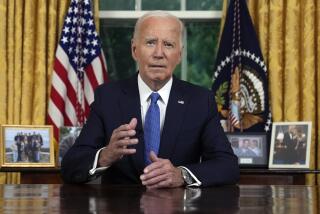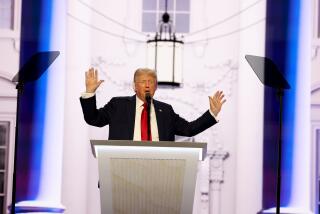NEWS ANALYSIS : President Sends Message He’s Back on Track
- Share via
WASHINGTON — Sporting a wireless microphone, an imposing looking thick, black binder, pie charts and a determinedly relaxed manner, President Clinton employed a prime-time press conference Thursday night to send a single message: “I’m back.”
Events as yet unseen, of course, will have much to do with whether that message proves accurate. But for White House strategists, who decided on the formal press conference only Wednesday, a rapidly unfolding series of events in the last 10 days provided an irresistible setting to try to convince Americans that the Clinton White House has turned a corner and has finally gotten on its feet.
Last year, in one of the key early moments of the long election campaign, Clinton moved quickly after polls closed in the New Hampshire primary to claim that his second-place showing had made him “the comeback kid.” In the same way, he used Thursday’s press conference to try to stitch together a series of small, but crucial, recent breakthroughs into a claim of suc-cess in the Washington game.
Over the last several days, Clinton’s economic program cleared a major hurdle in Congress and now seems likely to win ultimate passage. The Senate broke a Republican filibuster on campaign finance reform legislation, allowing Clinton not only to claim credit for trying to reform the political process but also undermining the sense, built up earlier this spring, that the filibuster could become an unbeatable weapon for thwarting Clinton’s programs. The White House also made progress in getting its national service program enacted, albeit in a substantially scaled-back form.
And on the foreign front, military officials gave Clinton enough good news to claim success in Somalia and the House approved Clinton’s plan to send aid to Boris N. Yeltsin’s government in Russia.
“We had good movement on three of our four major domestic policies plus two foreign policy victories,” said Clinton’s senior adviser George Stephanopoulos. “There’s a general feeling we’re getting it together.”
All that may prove completely transitory--just as an earlier spate of good news in late February and early March melted away as Clinton hit legislative reversals in April and May. But much of success in politics is a matter of psychology. And Clinton’s relaxed press conference demeanor reflects the fact that right now, the psychology of the White House, after weeks of near shellshock, has begun to turn.
Most important, aides say, the President himself is convinced things are getting better and has begun to have more confidence both in his own judgment and that of his top advisers.
When Clinton first arrived in Washington, aides now admit, he wondered about whether he understood the workings of the capital and tended to defer to the judgment of others--senior congressional leaders, senior Cabinet officials, such as Treasury Secretary Lloyd Bentsen, or others in the city’s “permanent government.” Then, Clinton discovered to his dismay that the plans he received from those advisers seemed to blow up in his face.
Now, after learning several bitter lessons in the ways of Washington, “he’s started to trust his own instincts,” a senior aide said shortly before the press conference.
Clinton gave some idea of his feelings in response to a question about his relations with the press.
“Everybody in America knows, as I’ve said, that I did not live and work in this city until I became President. I knew when I came here that there would be things that I would need to learn about the processes and the way things work. I believed then, and I believe now, that if I do the big things right, and deal with the big issues, that eventually the other things will also work themselves out,” he said.
Aides say his newly won confidence could be seen earlier this week in Clinton’s selection of federal appeals Judge Ruth Bader Ginsburg for the Supreme Court--a decision that had not been the first choice of his advisers, who had favored either Interior Secretary Bruce Babbitt or federal appeals court Judge Stephen G. Breyer.
But conveying that message of confidence to the country requires gimmicks--some small, such as the black binder carrying Clinton’s opening remarks in place of the four-by-six cards he used to use--others more noticeable, such as his bantering jokes with a reporter who stood up to ask a question while wearing a Mickey Mouse tie.
Later, after the press conference ended, Clinton borrowed the tie from the reporter and returned to the East Room to display himself, mouse tie-clad, to the assembled reporters and photographers.
But mostly the message was conveyed in language as Clinton largely avoided defensiveness and sprinkled his remarks with the sort of upbeat superlatives that his newly hired counselor, David Gergen, used to craft for Ronald Reagan.
Asked about the Senate’s campaign finance reform bill, which fell significantly short of the proposals Clinton made earlier this spring, the President proclaimed it a tremendous victory. “This is a vast advance over the present law, in breaking the back of special interest domination in politics and elections,” he said.
Asked if the fuels tax proposed by the Senate Finance Committee did not resemble closely the gasoline tax proposed during the Democratic primary campaign by former Sen. Paul E. Tsongas of Massachusetts--a levy Clinton sharply attacked at the time--the President merely smiled.
“It is a win-win situation” if the Senate passes the budget, he said, before going on to tout the fact that lower interest rates will allow middle-class families to save money by refinancing their homes or their credit card debt.
Asked at another point about a relatively obscure conflict between the United States and New Zealand over whether American ships that might carry nuclear weapons may visit New Zealand’s ports, Clinton let himself off with a laugh.
“I’ve given absolutely no thought to that question. And I’m afraid if I give an answer to it, I’ll be in more trouble tomorrow than I can figure out,” he said.
More to Read
Sign up for Essential California
The most important California stories and recommendations in your inbox every morning.
You may occasionally receive promotional content from the Los Angeles Times.











